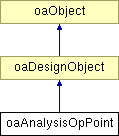 |
 |
 |
||||||
Inheritance diagram for oaAnalysisOpPoint:

 |
 |
Public Methods | |
| void | destroy () |
| oaBoolean | isBound () const |
| oaOpPoint * | getOpPoint () const |
| oaOpPointHeader * | getHeader () const |
| void | getOpPointName (oaString &name) const |
| void | getAnalysisLibName (oaString &name) const |
Static Public Methods | |
| oaAnalysisOpPoint * | create (oaAnalysisPoint *analysisPoint, oaOpPoint *opPoint) |
Public Types | |
| enum | { dtIndex = oacAnalysisOpPointDataType } |
| enum | { domain = oacNoDomain } |
The oaAnalysisOpPoint class can be observed by deriving from oaObserver<oaAnalysisOpPoint>.
|
||||||||||||
|
This function creates a new analysisOpPoint in the same design as analysisPoint to represent a reference to the opPoint operating point. An exception is thrown if the analysisPoint references an opPoint from a technology database that is not included in the graph of referenced technology databases for the technology database currently bound to the design containing the analysisPoint.
|
|
|
This function deletes this analysisOpPoint. |
|
|
This function returns the name of the oaAnalysisLib associated with this analysisOpPoint.
|
|
|
This function returns the opPointHeader associated with this analysisOpPoint. |
|
|
This function attempts to return the opPoint associated with this analysisOpPoint. If the analysisOpPoint is bound, a pointer to the opPoint is returned. Otherwise, NULL is returned. |
|
|
This function returns the name of the opPoint associated with this analysisOpPoint.
|
|
|
This function returns a boolean indicating whether or not this analysisOpPoint is bound. |
|
|
|
|
|
|

Copyright © 2002 - 2010 Cadence Design Systems, Inc.
All Rights Reserved.